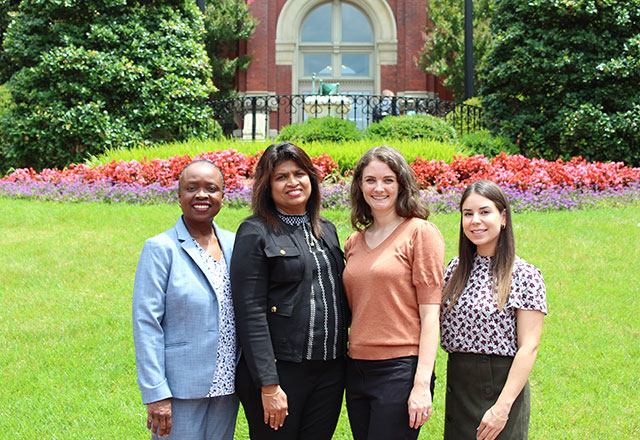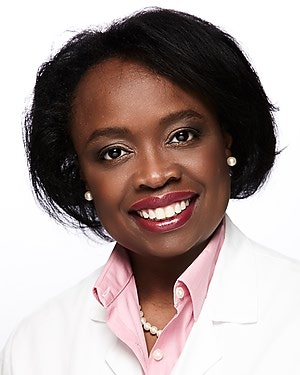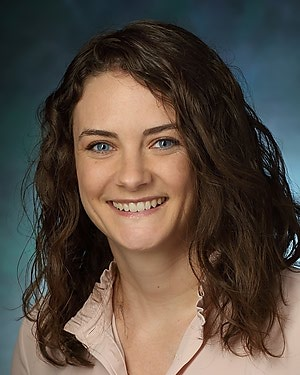Shaija Shelby Kutty, M.B.B.S.

- Director, Gastrointestinal Functional Treatment Center (GIFT)
- Assistant Professor of Pediatrics
Expertise: Pediatric Gastroenterology

The Johns Hopkins Gastrointestinal Functional Treatment (GIFT) Center is a multidisciplinary program for children with disorders of the gut-brain interaction (DGBI; previously called functional gastrointestinal disorders). Our integrative approach to functional gastrointestinal treatment is designed to care for more than the physical well-being of your child. Our mission is to care for the body, mind, and spirit.
DGBIs are highly prevalent in the community with some patients experiencing extreme discomfort and illness for prolonged periods of time. Approximately 15% of school age children experience functional abdominal pain.
DGBI is presumed to be caused by the input from overly sensitive gastrointestinal tract muscles and nerves that are processing signals in the brain (brain-gut axis). This may follow a gastrointestinal infection or occur during emotional disturbances in life, but also may happen with no triggers. In most instances it is difficult to understand the cause of abdominal pain. The pain may be associated with other symptoms like nausea, constipation or diarrhea. Symptoms may be frequent which may adversely affect the child's quality of life.
Our goal is to bring an integrative treatment approach by engaging the child and caregivers in activities that can help manage symptoms and move away from finding “the cause.” We understand the importance of incorporating specialists into one center. This enables immediate frontline care and improves the quality of life for patients and their families.
Click below to learn about each of our services at the GIFT clinic.
In the GIFT Center, we follow the biopsychosocial model which will provide collaborative care for the child and adolescent with functional abdominal pain. The GIFT team will identify pain triggers and work towards pain control involving cognitive behavioral therapy, multidisciplinary rehabilitation, integrative medicine approaches and nutritional services, thereby helping patients return to school and routine activities.
In most children, pain symptoms improve with counseling and reassurance that no serious organic pathologies are suspected, especially when the provider establishes a trustful relationship with the child and family. This approach has been validated for the treatment of functional abdominal pain.
We have started an IB-STIM program at Johns Hopkins to help patients with functional abdominal pain. IB-STIM is a non-invasive ear device that provides percutaneous electrical nerve field stimulation to target central pathways through cranial nerve branches that innervate the external ear. This device will be worn five days a week for four weeks as part of treatment.
In the GIFT center, we care for more than just the physical well-being of your child - we care for body, mind and spirit.
Integrative medicine combines the use of evidence-based conventional and complementary treatments in a coordinated way to support the best possible outcome for your child. At the appointment, we will discuss the goals for integrative treatment and develop a comprehensive treatment plan.
Integrative interventions may include strategies related to the mind-body connection such as mindfulness, hypnosis, biofeedback, aromatherapy, or acupressure as well as strategies for overall wellness including exercise, sleep, and physical environment. Our integrative approach strives to empower children and their families by giving them tools and resources to help with managing complex health conditions.
Because of the close relationship between the gut and the brain, children and adolescents with functional abdominal pain may also experience anxiety, sadness, irritability, or may withdraw from or stop doing activities they want or need to do. Additionally, stressful periods or increases in anxiety, mood, and behavior problems may also make abdominal pain worse.
Working with a psychologist can help kids and their families learn to cope with pain, build skills to continue to engage in activities and live with a chronic condition, and address concerns about anxiety, mood, or behavioral challenges that may be contributing to the experience of pain. A psychologist can also help with following the treatment plan (taking medications, making dietary changes, etc.) and help children increase their independence with their healthcare. Psychological interventions include behavioral therapy and/or cognitive behavioral therapy (CBT).
Caregivers play an important role and typically help coach their children in using these skills between visits.
Functional gastrointestinal disorders symptoms may lead to poor appetite, decreased intake, and eventually weight loss. During childhood and adolescence, adequate nutrition is an essential component of proper growth and development. The registered dietitian nutritionist will contribute to your child’s treatment by providing individualized evidence-based nutrition therapy, optimizing nutrition, and navigating symptoms through diet changes. Our main goal is for your child to resume their activities by managing symptoms through a holistic approach.
In the GIFT Center, our patients and their support system work closely with a dietitian who will provide individualized nutritional therapy to ensure your child’s nutritional needs and health goals are being met.
During your visits, the dietitian will complete a nutrition assessment and obtain information regarding your child’s:
The dietitian will consider your child’s information and clinical data to provide a customized nutrition plan to manage abdominal symptoms. Nutritional therapy varies on a case-by-case basis. However, dietary interventions may include a low FODMAP diet and the use of nutraceuticals. The GIFT Center team will work together to make sure you and your child receive suitable guidance, education, and support along the way.
Functional abdominal disorders affect both the patient and the family. The GI Nurse in the GIFT Center will help to facilitate case management to improve patient outcomes and experiences. The nurse, in coordination with all other members of the care team, will help to coordinate, implement, and oversee care plans over the course of patient treatment.
We are here to help you navigate the healthcare system and identify the best resources for your child. The nurse will be there to help guide you through this process and provide comfort and support, so that patients can have as much success in the GIFT Center as possible.
“I really appreciated that they provided practical suggestions that worked right away. It was holistic and integrative medicine approaches.”
Jessica Rosenbaum

Expertise: Pediatric Gastroenterology

Expertise: Hospice and Palliative Care, Integrative Medicine, Pain Management, Pediatrics

Johns Hopkins Children’s Center
Expertise, Disease and Conditions: nutrition support, pediatric GI disorders, gut rehab, failure to thrive (FTT), introduction/transition to solids with selective eaters and weaning of enteral nutrition (EN).

Pediatric Gastroenterology Nurse

Sr. Medical Office Coordinator

Your child and family will be meeting each GIFT Center provider on the same day of appointment.
To make an appointment please contact 443-997-5437 or 410-955-8769 opt 5, opt 1
David M. Rubenstein Building
200 N. Wolfe Street
Baltimore, MD 21287